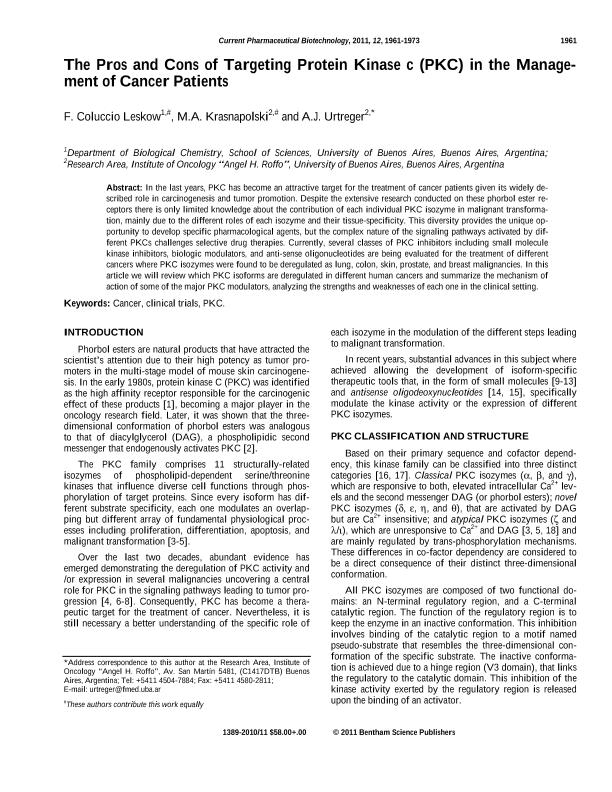Mostrar el registro sencillo del ítem
dc.contributor.author
Coluccio Leskow, Federico

dc.contributor.author
Krasnapolski, Martin Alejandro

dc.contributor.author
Urtreger, Alejandro Jorge

dc.date.available
2017-03-22T22:10:10Z
dc.date.issued
2011-11
dc.identifier.citation
Coluccio Leskow, Federico; Krasnapolski, Martin Alejandro; Urtreger, Alejandro Jorge; The pros and cons of targeting Protein Kinase C (PKC) in the management of cancer patients; Bentham Science Publishers; Current Pharmaceutical Biotechnology; 12; 11; 11-2011; 1961-1973
dc.identifier.issn
1389-2010
dc.identifier.uri
http://hdl.handle.net/11336/14224
dc.description.abstract
In the last years, PKC has become an attractive target for the treatment of cancer patients given its widely described role in carcinogenesis and tumor promotion. Despite the extensive research conducted on these phorbol ester receptors there is only limited knowledge about the contribution of each individual PKC isozyme in malignant transformation, mainly due to the different roles of each isozyme and their tissue-specificity. This diversity provides the unique opportunity to develop specific pharmacological agents, but the complex nature of the signaling pathways activated by different PKCs challenges selective drug therapies. Currently, several classes of PKC inhibitors including small molecule kinase inhibitors, biologic modulators, and anti-sense oligonucleotides are being evaluated for the treatment of different cancers where PKC isozymes were found to be deregulated as lung, colon, skin, prostate, and breast malignancies. In this article we will review which PKC isoforms are deregulated in different human cancers and summarize the mechanism of action of some of the major PKC modulators, analyzing the strengths and weaknesses of each one in the clinical setting.
dc.format
application/pdf
dc.language.iso
eng
dc.publisher
Bentham Science Publishers

dc.rights
info:eu-repo/semantics/openAccess
dc.rights.uri
https://creativecommons.org/licenses/by-nc-nd/2.5/ar/
dc.subject
Cancer
dc.subject
Clinical Trials
dc.subject
Pkc
dc.subject
Tumor Promotion
dc.subject
Malignant Transformation
dc.subject
Specific Pharmacological Agents
dc.subject
Anti Sense Oligonucleotides
dc.subject
Protein Kinase C (Pkc)
dc.subject
Therapeutic Target
dc.subject
Cell Membrane Receptors
dc.subject
Several Signaling Cascades
dc.subject
Cell Cycle Arrest
dc.subject
Normal Mammary Cells
dc.subject
Matrix Metalloproteinases (Mmp)
dc.subject.classification
Otros Tópicos Biológicos

dc.subject.classification
Ciencias Biológicas

dc.subject.classification
CIENCIAS NATURALES Y EXACTAS

dc.title
The pros and cons of targeting Protein Kinase C (PKC) in the management of cancer patients
dc.type
info:eu-repo/semantics/article
dc.type
info:ar-repo/semantics/artículo
dc.type
info:eu-repo/semantics/publishedVersion
dc.date.updated
2017-03-21T20:11:07Z
dc.identifier.eissn
1873-4316
dc.journal.volume
12
dc.journal.number
11
dc.journal.pagination
1961-1973
dc.journal.pais
Emiratos Árabes Unidos

dc.journal.ciudad
Sharjah
dc.description.fil
Fil: Coluccio Leskow, Federico. Consejo Nacional de Investigaciones Científicas y Técnicas; Argentina. Universidad de Buenos Aires. Facultad de Ciencias Exactas y Naturales. Departamento de Química Biológica; Argentina
dc.description.fil
Fil: Krasnapolski, Martin Alejandro. Consejo Nacional de Investigaciones Científicas y Técnicas; Argentina. Universidad de Buenos Aires. Facultad de Medicina. Instituto de Oncologia "Angel H. Roffo"; Argentina
dc.description.fil
Fil: Urtreger, Alejandro Jorge. Consejo Nacional de Investigaciones Científicas y Técnicas; Argentina. Universidad de Buenos Aires. Facultad de Medicina. Instituto de Oncologia "Angel H. Roffo"; Argentina
dc.journal.title
Current Pharmaceutical Biotechnology

dc.relation.alternativeid
info:eu-repo/semantics/altIdentifier/url/http://www.eurekaselect.com/75849/article
dc.relation.alternativeid
info:eu-repo/semantics/altIdentifier/doi/http://dx.doi.org/10.2174/138920111798376950
Archivos asociados
